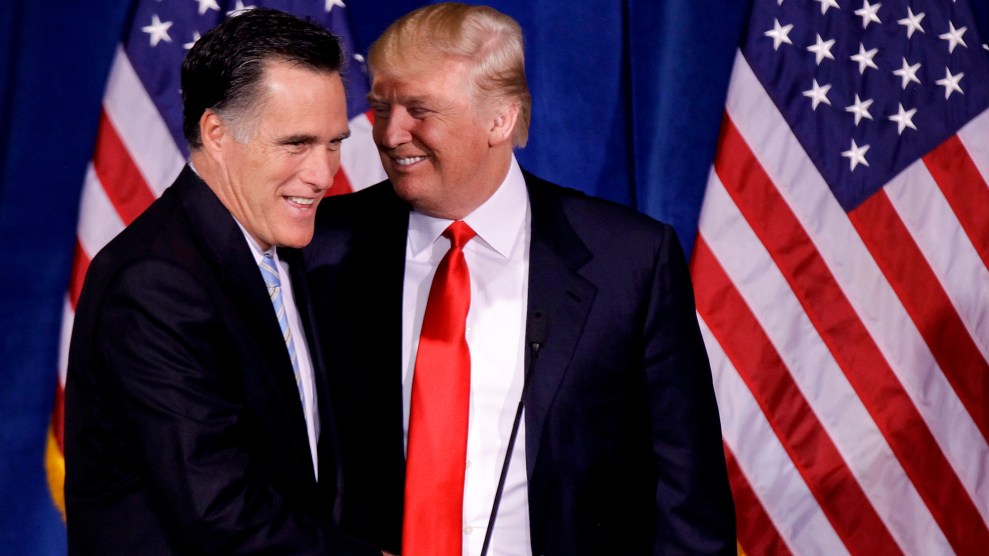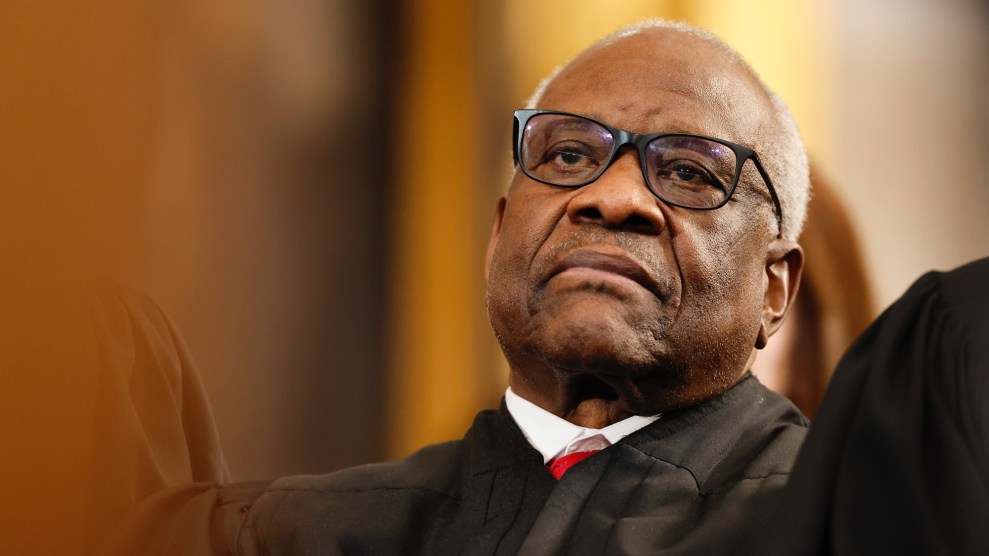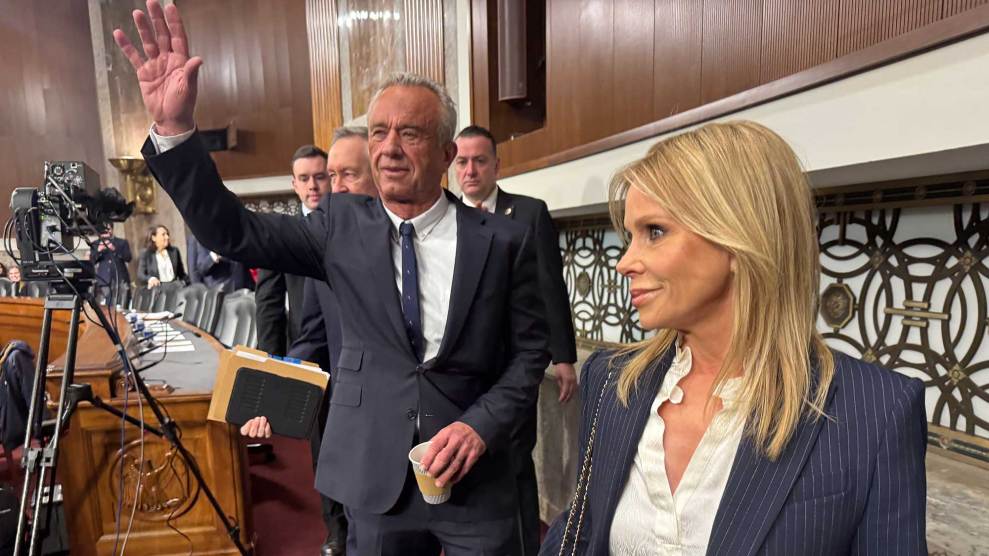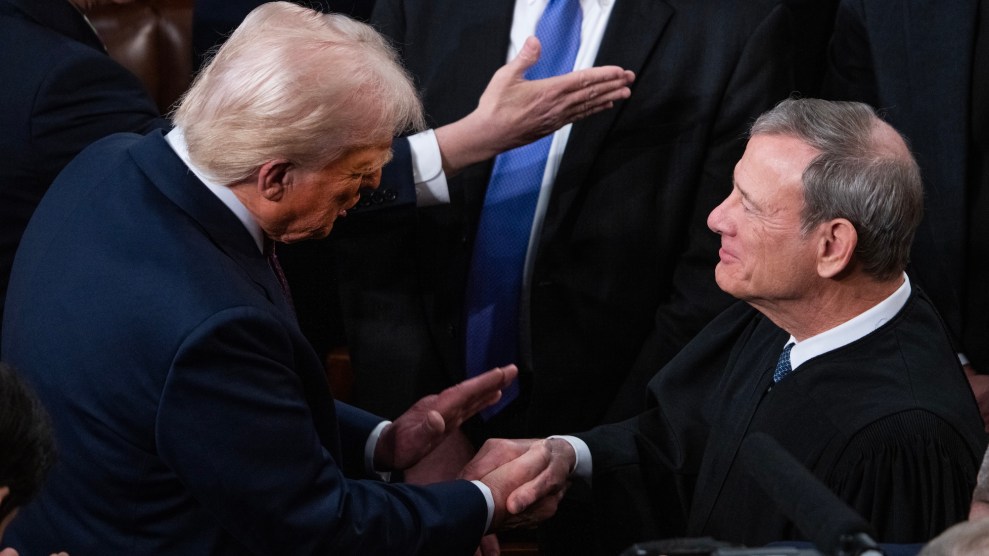When Donald Trump decided to back-burner the coronavirus crisis and reboot his reelection campaign with superspreader events in June, he headed to an arena in Tulsa, Oklahoma, to present his case for four more years. In front of an audience of maskless fans standing side by side, Trump performed his usual routine. He threw out buzzwords (“law and order,” “left-wing radicals”). He boasted. (“I have done a phenomenal job” responding to the pandemic.) He denigrated his opponent as “Sleepy Joe.” He obsessed over personal grievances and slights, devoting much time to slamming news outlets that had recently shown video of him walking gingerly down a ramp after delivering a commencement address at West Point. What was mostly missing from Trump’s speech: ideas.
Although he referred to his tax cuts for the wealthy, his appointment of conservative judges, and his “beautiful” wall on the US-Mexico border, Trump had little to say about economic policy, national security, health care, education, housing, the environment, and other subjects. Moreover, he offered no agenda for a second term other than vague promises of making everything swell. Days later, during a friendly Fox News “town hall,” Sean Hannity asked Trump to spell out his plans for a second term. He replied by rambling on about his inauguration and attacking John Bolton.
All this was nothing new for Trump, who approaches the presidency more as performance artist than policymaker. But in the Oklahoma crowd were many unmasked Republican senators and House members, who clapped along and looked delighted to be props for The Trump Show. Once upon a time, Republican legislators and party leaders claimed they cared deeply about certain foundational issues—the deficit, family values, free trade, hawkish foreign policy. Now they were cheering a twice-divorced adulterer who had run up the federal debt, sloppily imposed tariffs, and embraced the anti-American autocrats leading Russia and North Korea—a man devoid of serious thought and guiding policy principles, a self-fixated candidate who presented no intellectual framework for his presidency. Had the GOP become the party of no ideas?

Evan Vucci/AP
This seemed a premise worth exploring, so I thought I would check in with veteran Republicans who once were attracted to the party for its conservative ideals but who have become Trump critics. First on my list was Stuart Stevens, the chief strategist for Mitt Romney’s 2012 presidential bid. I should note that I feel a bit awkward when I talk with Stevens. Plenty of people have asserted that my exposé of the “47 percent” tape in 2012—remember Romney denigrating nearly half of Americans as freeloaders who want the government to take care of them?—played a part in his defeat. But Stevens has always been gracious when we have crossed paths. And this time was no exception. It turned out Stevens had much to say on the current state of his party. Actually, enough for an entire book.
Asked if the Republican Party in the Trump years has become an outfit free of governing ideas, Stevens went even further: “It was all a lie.” He noted that this was word-for-word the title of his forthcoming book, It Was All a Lie: How the Republican Party Became Donald Trump. The modern GOP, he said, never truly cared about the ideas it claimed to care about.
This was a stunning indictment coming from a longtime political consultant who had toiled on five Republican presidential campaigns and numerous Senate and gubernatorial races. “The Republican Party has been a cartel,” Stevens said excitedly. “And no one asks a cartel, ‘What’s your ideological purpose?’ You don’t ask OPEC, ‘What’s your ideology?’ You don’t ask a drug gang, ‘What’s your program?’ The Republicans exist for the pursuit of power for no purpose.”
He huffed that the Republican Party had not merely drifted away from its core positions, as sometimes occurs with political parties: “Fair trade, balanced budgets, character, family values, standing up to foreign adversaries like Russia—we’re all against that now. You have to ask, ‘Does someone abandon deeply held beliefs in three or four years?’ No. It means you didn’t ever hold them.” He added: “I feel like a guy who was working for Bernie Madoff.”
Stevens, an erudite fellow who is also a novelist and a travel writer, has become an emblematic ex-Republican. He once believed in GOP ideals and ideas. Now he saw it all as a huge con. His new book is a confession and cri de coeur. The first line is blunt: “I have no one to blame but myself.” In these pages, Stevens self-flagellates, calling himself a “fool” for his decades of believing—and lying to himself—that the Republican Party was based on “a core set of values.” Acknowledging his role, Stevens writes, “So yes, blame me. Blame me when you look around and see a dysfunctional political system and a Republican Party that has gone insane.” The book offers one overarching prescription for the GOP: “Burn it to the ground and start over.”
In our conversation, Stevens exploded with loathing for the party he once faithfully (and lucratively) served. He rejected the common view that Trump had hijacked the GOP. No, he explained, the triumph of know-nothing Trumpism marked the culmination of an internal conflict that had existed for decades between the party’s “dark side” and its professed ideals. Even William F. Buckley Jr., often hailed as a grand public intellectual and the founding father of the modern conservative movement, was “a stone-cold racist” in the 1950s, Stevens pointed out. (Buckley at that time considered white people more “advanced” and more fit to govern.)
“A lot of us in the party liked to believe the dark side was a recessive gene, but it’s a dominant theme,” Stevens, a seventh-generation Mississippian who was named for Confederate Gen. Jeb Stuart, told me. “And it’s all about race. The Republican Party is a white party and there still are more white people than non-white people.” So that is whom the party aims at—even if this will eventually be a losing proposition as the nation’s demographics continue to shift. Ronald Reagan achieved a landslide victory in 1980 by bagging 56 percent of white voters; 28 years later, John McCain lost with 55 percent of white voters. Perhaps the party’s fixation on white voters can work one more time with Trump in 2020. “But we’re talking about the Confederacy—literally,” Stevens said.
And Nazi Germany. On his own, with no prompting, Stevens went straight to the Defcon-1 analogy: “I tell my GOP friends, ‘It’s crazy to say it’s 1934 in Germany…when it’s clearly 1936.’” He insisted that the 1930s are important for understanding the current moment. “When there was rising anti-Semitism, isolationism, and pro-Nazi sentiment, why did the US not become fascist?” Stevens asked. “Because of FDR. Leaders matter, and the GOP has now completely abdicated its role.” Instead, the party has yielded completely to demagoguery and race-baiting to exploit the racism and resentments of certain white voters. Throughout his decades as a Republican, Stevens considered this racist element a bug in the system. He now realizes it has been a feature.
In 2012, Romney enthusiastically sought and accepted Trump’s endorsement, though Trump had been championing the racist birther conspiracy theory. But for Stevens, the decisive moment when the party embraced its ugly heritage came in December 2015, when Trump, then the leading Republican presidential candidate, called for a ban on Muslim travelers to the United States. As Stevens now sees it, Reince Priebus, then the chair of the Republican National Committee, should have declared that the GOP did not support such bigotry and staked out a moral position. Perhaps Trump would still have marched on to victory, but such a move might have distanced the party from a racist candidate. Instead, the party kept mum and eventually folded to Trump. (Romney would go on to be the only GOP senator to vote to remove Trump from office at the end of his impeachment trial.)
Stevens now argues that Trump’s rise was not a fluke that the party can sidestep or survive. “This is the complete moral collapse of a governing party of a major superpower,” he remarked. He wonders how he could have been blind to the GOP’s racism and turpitude for so long. “It is hard to see this when you’re in the middle of it,” he said. “The only analogy I can find is the collapse of the Communist Party in the Soviet Union, when the difference between reality and what is believed became so disjointed. I should’ve seen this. I did see this, but I wanted to believe the crazies were a minority.”
Stevens conceded that had Trump not come along, he still might not have been fully aware of the structural immorality of the GOP: The Republican Party was “a comfortable place for a lot of us. If Trump had lost, I’d probably still be working for a Republican candidate. But Trump made it impossible to deny what the party is. I just don’t get why these Republican senators don’t stand up to him. What’s the worst thing? You’ll be an ex-senator? They are the Trump Generation. It’s how they will be remembered. Like the segregationists of old.”
It was hard to slow Stevens down as he spoke. He had so much to confess. He forecast a bleak future for the party. Citing the demise of the Republican Party in California (where more voters are now registering “no party preference” than Republican), he observed that the GOP was becoming a “regional/Sun Belt party.” And he shared his fear that young political operatives working for the party have drawn the lesson that a candidate must emulate Trump to win—that what most matters is not policy ideas but the ability to attack and exploit fears, divisions, tribalism, and resentments. “Elizabeth Warren can articulate a coherent theory of government,” Stevens said. “There is no coherent theory of government for Republicans right now. Usually a coherent theory versus an incoherent theory carries the day.”
“It’s really incredible how this had happened,” Stevens told me, as I realized I had received far more material from him than anticipated. “This is the last book in the world I wanted to write. It is tough to come to terms with this, and incredibly depressing. If we say we believe in personal responsibility, you have to take personal responsibility and start with yourself. We created this. It didn’t just happen.” Stevens was not pleased or satisfied with his epiphany: Ideas are not the currency for today’s GOP and never truly were. And Trump alone could not be blamed for that. “Republicans only exist to elect Republicans,” Stevens remarked with sadness. “They are down to one idea: How can we win?”

















